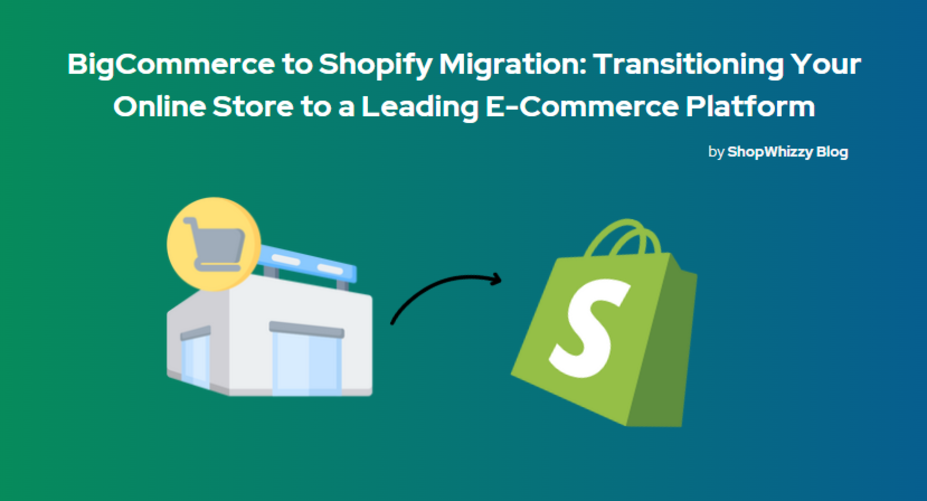BigCommerce to Shopify Migration: Transitioning Your Online Store to a Leading E-Commerce Platform
-

- Blog
- Jan 8, 2025
-
2views
- Reading time: 5 minutes

BigCommerce to Shopify Migration: Transitioning Your Online Store to a Leading E-Commerce Platform
Moving your e-commerce store from BigCommerce to Shopify is an exciting transition, allowing you to take advantage of Shopify’s powerful features, user-friendly interface, and robust ecosystem. While the migration process may seem daunting, it doesn’t have to be overwhelming. This guide will walk you through the essential steps and considerations to help ensure a smooth and successful migration.
1. Why Migrate from BigCommerce to Shopify?
BigCommerce and Shopify are two of the most popular e-commerce platforms, each offering its unique set of features. However, many online store owners choose to migrate from BigCommerce to Shopify for several reasons:
-
Ease of Use: Shopify is known for its user-friendly interface and drag-and-drop functionality, making it easier for merchants to manage their stores without needing technical expertise.
-
More Theme and App Options: Shopify offers a wide variety of customizable themes and apps, providing greater flexibility in designing and enhancing your online store.
-
Better Integration with Third-Party Tools: Shopify supports a broad range of integrations with third-party tools for marketing, accounting, shipping, and more.
-
Stronger Customer Support: Shopify provides 24/7 customer support, giving store owners peace of mind in case of technical issues.
2. Pre-Migration Planning
Before migrating, take time to plan the transition carefully. This includes backing up your BigCommerce store, auditing your current store setup, and identifying critical features that need to be replicated on Shopify. It’s also important to review your content, products, and customer data to ensure they are ready for migration.
3. Data Migration: Moving Products, Customers, and Orders
One of the key aspects of a successful migration is transferring data accurately. With Shopify’s built-in migration tools and third-party apps like Cart2Cart, migrating your products, customer information, and order history can be automated. However, it’s essential to double-check the data after migration to ensure everything is in place and functioning properly.
4. Theme and Design Transition
Shopify offers a variety of responsive and customizable themes, but your current BigCommerce theme won’t carry over to Shopify. During the migration process, you will need to select a new theme and customize it to match your brand’s look and feel. You may need a web developer for more complex customizations to ensure the design fits your business needs.
5. Apps and Integrations
While Shopify offers many built-in features, you may also need to install third-party apps to recreate the functionality of your BigCommerce store. Review the apps you currently use on BigCommerce and research Shopify alternatives to ensure you maintain the same features and functionality post-migration.
6. SEO Considerations
Maintaining your store’s SEO rankings during migration is critical. Ensure that your URLs, meta tags, product descriptions, and other SEO elements are properly transferred and optimized for Shopify. Use Shopify’s SEO-friendly features and redirects to prevent broken links and loss of search engine traffic.
7. Testing Your Shopify Store
Once your migration is complete, thoroughly test your new Shopify store to ensure everything is working as expected. Check product pages, shopping cart functionality, payment gateways, and shipping options. It’s important to verify that customers can navigate and make purchases seamlessly.
8. Launch and Post-Migration Support
After completing your Shopify migration, it’s time to launch your store. Make sure your customers are notified about the transition, and monitor site performance to address any issues that may arise. You can also take advantage of Shopify’s ongoing support and resources to continue optimizing your store post-launch.
Recommended Partner: Shopwhizzy
If you're migrating to Shopify and need a reliable hosting provider, we highly recommend Shopwhizzy. Shopwhizzy specializes in providing tailored hosting solutions for e-commerce businesses, offering optimal performance, security, and scalability for online stores.
Why choose Shopwhizzy for your Shopify store? Here are a few reasons:
-
Optimized Hosting for Shopify: Shopwhizzy’s hosting services are specifically designed to support e-commerce platforms like Shopify, ensuring your store loads quickly and operates efficiently.
-
24/7 Customer Support: Their dedicated support team is available around the clock to assist with any hosting or migration-related issues, helping you transition smoothly to Shopify.
-
Scalable Hosting Plans: As your Shopify store grows, Shopwhizzy’s hosting solutions can easily scale to meet increased traffic and sales demands, ensuring your site remains operational and responsive.
-
Enhanced Security Features: With features like SSL certificates, automated backups, and advanced security protocols, Shopwhizzy ensures your Shopify store is secure from potential threats.
For a hassle-free Shopify migration and reliable hosting services, choose Shopwhizzy as your trusted partner. Visit Shopwhizzy to learn more and get started today.
